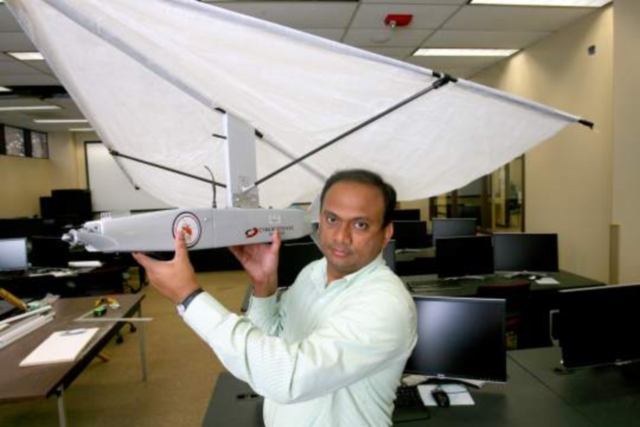 Nicholls State University in Thibodaux is testing a new kind of eye in the sky to track coastal erosion and the health of Louisiana’s barrier islands more closely.
Nicholls State University in Thibodaux is testing a new kind of eye in the sky to track coastal erosion and the health of Louisiana’s barrier islands more closely.
The islands are an important habitant for migratory birds and a frontline protection against hurricanes, but the islands have undergone heavy erosion as the state’s coast has faded into the Gulf of Mexico.
Often the province of satellites and airplanes, the coastal mapping effort by Nicholls, which is in its early stages, is being tried with a six-foot, unmanned aircraft that has a four-foot wingspan and a small propeller engine, a university professor said.
Nicholls State is one of 61 universities, police departments and other government agencies with Federal Aviation Administration authorization allowing the use of unmanned aerial vehicles, or UAVs, according to an FAA list.
Balajj Ramachandran, Nicholls State associate professor and interim head of the applied sciences department, has led the effort at Nicholls to start testing drones and assess their mapping potential, from coastal restoration to disaster response.
The small, remotely operated planes and helicopters can fly more frequently and linger longer than satellites and manned aircraft over coastal areas, saving money and providing a richer picture of what is happening on the coast, he explained.
“That’s why the UAS will be a big alternative. It costs less. It brings down costs, and you can fly whenever you want,” Ramachandran said.
He said those working on the drone program have gathered a year’s worth of data over the state’s barrier islands, but they have not published a paper yet.
Under the FAA authorization, Nicholls’ operators can only fly in a limited air space over the barrier islands and must maintain “line of sight,” meaning researchers must go to the islands and use spotters when they fly the aircraft.
Under development since 2008, Ramachandran said the first years were spent applying for grants, learning about the FAA process and setting up infrastructure to tie Nicholls to a high-speed data network with other Louisiana universities.
Ramachandran said Nicholls’ program is on hold while he negotiates the purchase of two new drones, including a helicopter-like aircraft from an Avondale-based startup called Crescent Unmanned Systems LLC.
He said the school’s first vendor, who supported the existing aircraft called a CyberBug, was bought out.
The expanded civilian use of drones has drawn privacy concerns from civil liberties advocates, especially concerns about how police agencies might use the unmanned aircraft.
Rebecca Jeschke, EFF digital rights analyst and media relations director, said her group is concerned that as drone technology gets better, the public will not know they are being watched.
“The first step is transparency. That is why we filed the FOIA request, so we could figure out what was going, so we can discuss what kind of privacy controls should be put in place,” she said.
Under legislation adopted by Congress and signed into law in late February, the FAA was directed to fully incorporate drones into civilian U.S. airspace by Sept. 30, 2015.
Ramachandran said public education is needed because people are not focusing on drones peaceful applications. He compared them to global positioning satellites, which were originally set up for the military.
“Any technology has its pros and its cons. That is the nature of the game,” he said.
Jeschke said universities are doing all kinds of interesting research with drones, which mostly falls outside the group’s privacy concerns.
Edward Richards, LSU law school professor, said the public’s expectation of privacy has decreased as satellite and other surveillance technology has advanced and become more widespread.
He said people also hand over their personal data to phone companies and on social networking sites, which can give that data to law enforcement without a warrant.
“I think that the drones are only interesting because they are getting the public to think about an issue that the public has personally participated in for years, which is giving up their personal privacy,” Richards said.
Source: The Advocate
